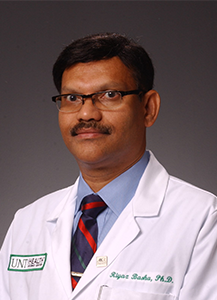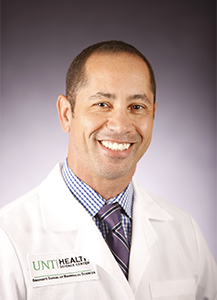Health disparities research: ‘The HEARD Scholarship is going to make my dreams come true’


The University of North Texas Health Science Center at Fort Worth (HSC) is one of two institutions nationwide receiving NIH Endowment funding that will be used for a scholarship to support two faculty members developing programs focused on minority health and health disparities.
Riyaz Basha, PhD, an Associate Professor in the Texas College of Osteopathic Medicine (TCOM), and Harlan P. Jones, PhD, an Associate Professor in the Graduate School of Biomedical Science (GSBS) are the recipients of the scholarship.
Dr. Basha and Dr. Jones will continue researching minority health and health disparities, as they have been awarded the Health, Education, Awareness and Research in Disparities (HEARD) Scholarship.
The scholarship — funded by the Minority Health, Education, Research and Outreach (MiHERO) endowment grant from the National Institute of Minority Health and Health Disparities (NIMHD) — was created to provide HSC faculty resources needed for developing impactful educational and research programs.
Successful minority health and health disparities research relies on funding provided to researchers, so they can dedicate time and resources to pursue these areas of study.
“NIMHD provided the endowment funding to develop minority health and health disparity infrastructure at HSC to make HSC a national leader in this area,” said Dr. Jamboor Vishwanatha, Regents Professor and principal investigator of the NIMHD Endowment Award. “Supporting HSC faculty through the HEARD Scholarship is an important step in developing a sustainable health disparities research and education infrastructure.”
The HEARD Scholarship will allow the awardees, who are both active leaders in HSC’s Institute for Health Disparities, to build upon their current research and pursue new areas, while guiding the next generation of health disparities researchers through developing educational programs with this focus.
“We are very proud of Dr. Jones’ leadership in health disparities research and look forward to his continued contribution as a HEARD Scholar in progressing health care access for all. He is not only an outstanding faculty member in GSBS but is also an alumnus of our graduate program making this award even more noteworthy to us,” said Michael Mathis, PhD, EdD, Dean of GSBS.
Respiratory immunology is at the forefront of Dr. Jones’ research — which includes delineating the causal relationships between psychosocial stressors and immune function as a gateway to a deeper understanding of the risks, onset and progression of disease. Diseases studied include cancer, asthma and infectious diseases, that disproportionately affect minority and underserved populations.
“I was drawn to apply to the HEARD Scholarship for an opportunity to position my research program in a manner that can begin to address health disparities,” said Dr. Jones. “I knew this award would also fulfill my greater passion of training and providing opportunities for diverse populations to solve problems around health disparities.”
Dr. Jones wants to expand his research to better understand how issues that occur during the early years of one’s life may impact the biological and psychosocial aspects of long-term health and health disparities. This scholarship will help him delve deeper into this topic.
“Often, we look at disease progression through the lens of adulthood onward, but we believe there’s an opportunity to look upstream of that,” said Dr. Jones. “We know that early life events are very stressful, particularly for populations that are under certain environmental and community stressors, and that may have an adverse impact over one’s lifespan. This is one of the new directions that we hope to explore through the HEARD Scholarship.”
Dr. Basha’s research focuses on understanding health disparities in child, adolescent, and adult cancer patients. He is investigating the biological molecules that play a role in how cancer cells evade chemotherapy or radiation therapy, especially among patients from certain ethnic/racial groups.
Dr. Basha is also passionate about training and mentorship. As a certified mentor and facilitator, he works to promote mentorship among faculty by training them to mentor students.
Dr. Basha’s strong presence in the health disparities field of research and training made him a top candidate for the HEARD Scholarship.
“The HEARD Scholarship is going to make my dreams come true,” said Dr. Basha. “It is going to provide me the resources and time that I need to spend on educational, research and training activities to promote the awareness of health disparities and increase the number of underrepresented minorities in the biomedical workforce.”
The scholarship will allow Dr. Basha to explore new ways to address health disparities and community engagement in research.
“In addition to addressing nationwide health issues, I want to focus more on health issues that impact our communities,” said Dr. Basha. “My research will engage our local and regional partners. It is important to find solutions to cancer health disparities that exist in Tarrant County and Texas.”
The funding award is a source of pride at HSC.
“We are incredibly proud of Dr. Basha for being selected to receive this scholarship funding that will create programs to address health disparities,” said Dr. Frank Filipetto, Dean of the Texas College of Osteopathic Medicine. “This funding and research will have a tremendous impact in addressing one of the most important problems facing health care today. Dr. Basha is so passionate about his research and we are so fortunate that he is part of the TCOM and HSC family.”
While Dr. Basha and Dr. Jones continuously incorporate minority health in the classes they teach in their respective colleges, they also team-teach a GSBS course called Introduction to Health Disparity Issues in the United States.
This gateway course provides an opportunity for the next generation of researchers to understand health disparities and learn how to address them, through observing the issue from the public health, medical health professional and basic biomedical research perspective.
“I hope the biggest aspect that our students take from our class is a definition of what health disparities are,” said Dr. Jones. “When they go into the field as a professional, I hope they have a keen awareness of the cultural differences we share and how those cultural differences and all the social determinants of health may influence how they deliver their care to these diverse populations.”
Dr. Basha and Dr. Jones’ future research and educational work, made possible by the HEARD Scholarship, will continue to support HSC’s mission of creating solutions for a healthier community.






Social media